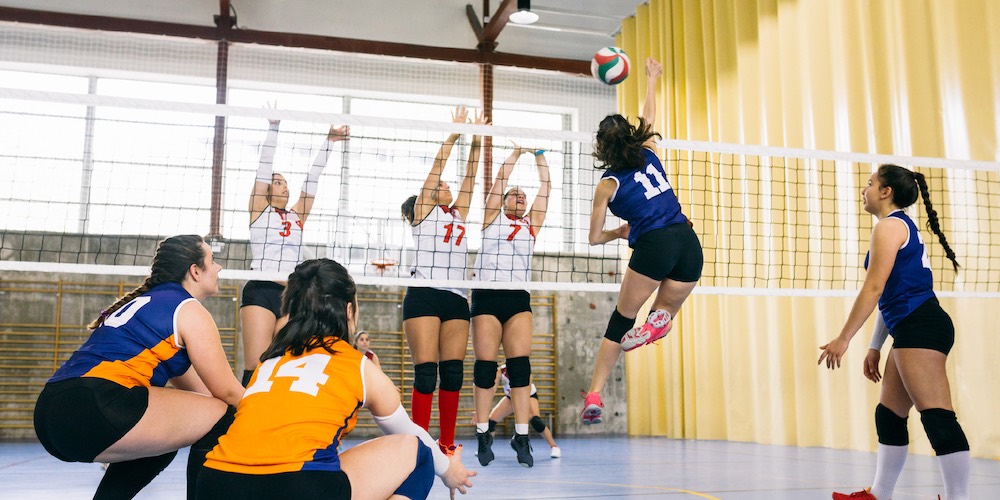Nutrition Advice for Youth Volleyball Players and Their Coaches

The Importance of Nutrition for Volleyball Players
Volleyball is a high-energy sport that demands quick reflexes, powerful jumps, and sustained endurance. To excel on the court, players need a nutrition plan that supports their unique physical demands. Nutrition can be a key factor in enhancing volleyball performance and supporting overall health. It can provide:
- Energy Production: Volleyball involves short bursts of intense activity, making carbohydrates important for quick energy during matches and training.
- Muscle Recovery: Frequent jumping and rapid movements require protein to repair and build muscle tissue after practices and games.
- Hydration: Adequate fluid intake helps maintain agility and quick reflexes, helpful for effective serves and spikes, while minimizing the risk of dehydration-related fatigue.
- Mental Sharpness: Balanced nutrition helps support cognitive function, which is helpful for quick decision-making and strategic plays.
- Injury Prevention: Proper nutrition can strengthen muscles and joints, helping to prevent common volleyball injuries like ankle or wrist sprains and concussions.
Key Nutritional Components for Young Volleyball Players
- Carbohydrates: These are the primary energy source for the quick, explosive actions required in volleyball.
- Proteins: Helpful for muscle repair and growth, protein sources include lean meats, fish, eggs, dairy, and plant-based options like beans and lentils.
- Fats: Healthy fats from sources like avocados, nuts, seeds, and olive oil can provide long-lasting energy and support hormone production, which is important for recovery and performance.
- Vitamins and Minerals: A varied diet rich in fruits and vegetables can ensure players get essential micronutrients for bone health and energy metabolism, important for maintaining stamina and agility.
- Hydration: Water is important for maintaining performance, and electrolyte-rich sports drinks can help replenish lost minerals during intense matches.
Hydration Tips
- Water: Encourage players to drink water consistently throughout the day to stay hydrated and maintain performance.
- Sports Drinks: Beneficial during high-intensity or prolonged activities to replace lost electrolytes and prevent cramps.
- Natural Hydration: Snacks like cucumber and watermelon contribute to overall hydration and provide quick energy.
A Nutritional Breakdown for a 150-Pound Volleyball Player
Pre-Workout Nutrition
3-4 hours before training:
Calories: 500-700 kcal
Carbohydrates: 70-100 grams
Protein: 20-30 grams
Example Meal: Whole Grain Pasta with Marinara Sauce and Grilled Chicken
30-60 minutes before training:
Calories: 150-200 kcal
Carbohydrates: 30-40 grams
Protein: 5-10 grams
Example Snack: Smoothie with Spinach, Banana, and Almond Milk
During Training
Hydration and Quick Energy:
Calories: 50-100 kcal per hour
Carbohydrates: 12-25 grams per hour
Example: Sports Drink or Coconut Water
Post-Workout Nutrition
Within 30 minutes after training:
Calories: 200-300 kcal
Carbohydrates: 30-50 grams
Protein: 15-20 grams
Example Snack: Greek Yogurt with Honey and Berries
1-2 hours after training:
Calories: 500-700 kcal
Carbohydrates: 60-90 grams
Protein: 25-35 grams
Example Meal: Stir-Fried Tofu with Brown Rice and Mixed Vegetables
Healthy Snacks for Sustained Energy
Snacks can be important for maintaining energy levels throughout the day, especially between school, practice, and matches:
- Peanut Butter and Apple Slices: Provides carbohydrates and healthy fats for sustained energy.
- Trail Mix with Nuts, Seeds, and Dried Berries: A convenient source of energy and nutrients.
- Veggie Sticks with Hummus: Offers protein and fiber for a light, energizing snack.
- Rice Cakes with Avocado: A good mix of carbohydrates and healthy fats for quick energy.
Proper nutrition is important for volleyball players aiming for peak performance. By focusing on balanced meals, appropriate timing, and hydration, players can enhance their energy levels and recovery. Parents play a key role in supporting their young athletes with nutritious meals and snacks, helping ensure they are always prepared to give their best on the court.
For personalized nutrition plans, consulting a sports nutritionist can provide tailored recommendations to meet a young volleyball player’s specific needs and goals.
Help Protect Your Volleyball Player
Put pomi on your team and serve up reassurance with youth volleyball insurance. Choose from two fantastic coverage options or combine them to help protect your athlete against the unexpected on the court!
We do not provide nutrition advice for health or disease purposes. Always consult with your physician before implementing a nutrition plan.

